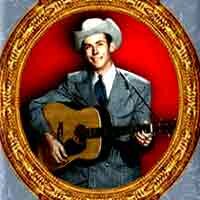|
|
|||
|
|
|||
|
MP3 Exclusives |
|||
|
New Arrivals |
|||
|
Alt-Country Alternative Blues Electronic Jambands Jazz Metal Pop Punk R&B Rap/Hip Hop Reggae Rock |
|||
|
Top Downloads Features Archive Contests Control Panel MUSICBLITZ Alert! |
|||
| METALBLITZ REGGAEBLITZ BLUESBLITZ Musician's Friend |
|||
| Alt-Country Alternative Blues Electronic Jambands Jazz Hip Hop Metal Pop Punk R&B Reggae Rock |
|||
|
Getting Started Free Players |
|||

|
Welcome ! |

|
 |
Hank Williams Jimmie Rodgers may be the "Father of Country Music" and Garth Brooks may've brought country into the mainstream, but between that alpha and omega lies Hank Williams. Lean, gaunt, and plagued by personal demons, Hank sang directly to the heart and soul. Born in rural Alabama, Williams was heavily influenced by the country music that permeated the South, particularly Rodgers, Roy Acuff, and Earnest Tubb. He moved to Montgomery, AL, in 1937 and formed the first incarnation of his legendary backing band, the Drifting Cowboys. By 1943, he’d met and married Audrey Mae Sheppard, with whom he’d have a turbulent relationship until the end of his life. At Audrey’s insistance, the couple traveled to Nashville in 1946 to meet with recording executive Fred Rose of Acuff-Rose Publishing. After securing a deal with Rose, Hank cut his first singles, "Never Again" and "Honky Tonkin'," both successful enough to earn him a contract with MGM Records. Hank’s first single for MGM, "Move It On Over," was a hit -- but his breakout song appeared in the form of a Tin Pan Alley classic called "Lovesick Blues." The incredible popularity of the song landed Hank a coveted spot on the Grand Ole Opry, where he performed an unprecedented six encores of "Lovesick Blues." By 1949, Hank was a national star and a recording phenomenon, with a string of hits under his belt; his 1951 smash "Cold, Cold Heart" was a crossover pop success thanks to a recording by Tony Bennett. But as Williams’ career soared, his personal life took was in a perpetual nosedive. Chronic alcoholism and an addiction to painkillers led to Hank's increased unreliability on tours -- he lost his spot on “the Opry,” and in 1951, was divorced from Audrey. On New Year’s Day 1953, just as his last hit was ascending the charts (the ironically titled "I'll Never Get Out Of This World Alive”), Hank died en route to a gig in Canton, OH. Typically, the country music establishment who had reviled Williams in his final years were the first to elevate him to almost mythic status after his death – though no hype was really necessary. There's no questioning Hank Williams' influence on almost all country music that followed, both stylistically, and in the "live fast, die young" ethic he embodied. For fans the world over, Hank Williams is country music. |
| Hank Williams |
|
Why Don't You Love Me | WinMedia |      |
Alt-Country | |||
| It's Hank Williams -- what else do you need to know? Masterful honkytonk from the hillbilly Shakespeare. |
||||||||
| Privacy Policy | Company | Contact | Press | Jobs |
©1999-2001 MUSICBLITZ. All right reserved.